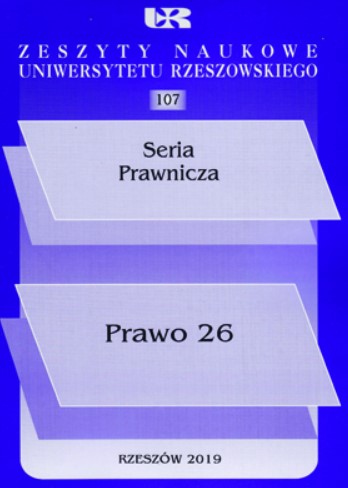TRUDNE POCZĄTKI I BARIERY POWOJENNEJ ROMANISTYKI POLSKIEJ
THE DIFFICULT BEGINNINGS AND BARRIERS OF THE POST-WAR POLISH ROMANISTICS
Author(s): Bożena Czech-JezierskaSubject(s): History of Law, Political history, Marxism, Politics and law, WW II and following years (1940 - 1949), Post-War period (1950 - 1989)
Published by: Wydawnictwo Uniwersytetu Rzeszowskiego
Keywords: legal history; Roman Law in socialist states; Marxist ideology; Roman Law in Poland; History of the Roman Law science in Poland;
Summary/Abstract: The rebuilding plan of Roman law science after Second World War was experiencing many difficulties. Aside from the inconvenience such as financial problems, conducting classes facilities, lack of access to literature etc., ideology barrier appeared. Socialist-oriented ideology generally left Roman law out of its legal system which rejected development of private property for the benefit of far-reaching state interference in private-law relationships and any influence on the part of the legal system of a state that allowed slavery, inconsistent with the ideas of socialism. It was based on historical and dialectical materialism and was connected with the inevitable fight of classes in society. The socialist ideology also played the decisive part in an educational system. Socialists were in principle against the study of Roman law and tried to limit his role in educating socialist lawyers – “lawyers of the new type”. They tried to conduct the reform of law studies and partly they made a success of it. In socialist states two tendencies in Roman law studies should be distinguished – “traditional” Roman law studies, referred to as “bourgeois”, and new “Marxist Roman law studies”. Some explorers of this tendency believed that it was only “Marxist Roman law studies” that required further development, while “bourgeois Roman law studies”, opposed to the former, could only provide a basis of information collected by its researchers. These polemics increased especially in breakthrough moments, when Roman law was marginalized or even abandoned in faculties of law. Exactly these turning points could prove helpful in performing periodization of Polish Roman law studies in People’s Poland began in the early 1940s.
Journal: Zeszyty Naukowe Uniwersytetu Rzeszowskiego - Seria Prawnicza
- Issue Year: 2019
- Issue No: 26
- Page Range: 24-39
- Page Count: 16
- Language: Polish

